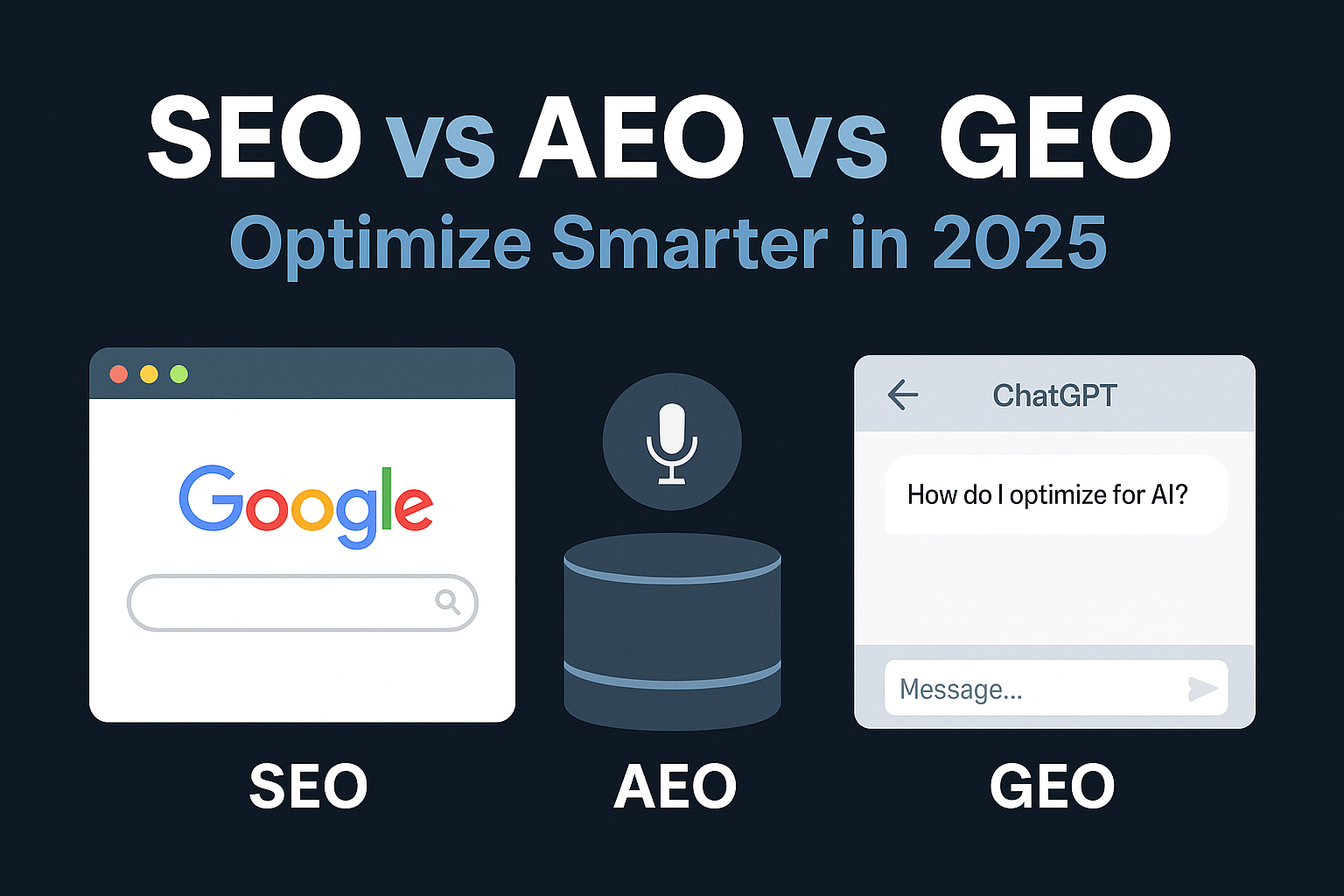“SEO vs AEO vs GEO” isn’t just the latest marketing buzzphrase—it’s a strategic breakdown of how brands stay visible in 2025. Traditional search engine optimization (SEO) alone won’t get your content seen anymore. You now have to think beyond the search bar.
The modern digital visibility stack includes:
-
SEO: Classic search engine traffic
-
AEO: Voice-based and featured-snippet visibility
-
GEO: AI-driven search results inside tools like ChatGPT, Gemini, and Perplexity
Let’s break down what each means, how they differ, and why you need all three working together.
What is SEO? (Search Engine Optimization)
SEO is your baseline for discoverability. It optimizes your site and content to rank on platforms like Google and Bing.
🔧 Core Tactics:
-
Keyword research and mapping
-
Meta titles and descriptions
-
Backlink building
-
Mobile performance and load speed
-
Structured internal linking
-
Technical SEO elements (sitemaps, crawlability)
📈 Why It Still Matters:
Google search remains the biggest driver of web traffic. SEO is foundational, and if it’s not in place, nothing else matters. But in the SEO vs AEO vs GEO equation, it’s just the starting point.
What is AEO? (Answer Engine Optimization)
AEO is about getting your content served as the answer—not just a link in the list. This matters for voice search optimization and zero-click experiences like Google’s featured snippets.
🔧 Core Tactics:
-
FAQ sections with clear, concise answers
-
Schema markup using Schema.org
-
Bulleted lists, definition boxes, and question-based headers
-
Optimized content for mobile and smart assistants
📈 Why It Matters Now:
50%+ of mobile users are speaking, not typing. Alexa, Siri, and Google Assistant pull from structured answers. If your content isn’t AEO-friendly, you’re invisible in these interactions.
What is GEO? (Generative Engine Optimization)
GEO is the newest frontier. This is about how AI tools like ChatGPT and Gemini “see” and surface your content.
You’re no longer optimizing for web crawlers—you’re optimizing for language models that synthesize data and cite sources.
🔧 Core Tactics:
-
Write original, first-source content
-
Use conversational language and long-tail questions
-
Avoid fluff—focus on clarity, trust, and usefulness
-
Make data points, frameworks, and stats easy to quote
-
Ensure brand mentions are clean and consistent across the web
📈 Why It’s Essential:
Users are now asking AI directly instead of Googling. These tools choose which sources to mention. Generative engine optimization puts your content in their data pipeline.
Visual Comparison: SEO vs AEO vs GEO
| Optimization Type | Focus Platform | Strategy Type | Goal |
|---|---|---|---|
| SEO | Google, Bing | Keyword + Technical | SERP ranking |
| AEO | Voice assistants, snippets | Structured + Conversational | Direct answer delivery |
| GEO | ChatGPT, Perplexity, Gemini | AI-sourceable Content | Appear in AI-generated responses |
So, Which One Matters Most?
In the showdown of SEO vs AEO vs GEO, the answer isn’t “pick one.” The answer is “stack them.”
-
Start with SEO to get foundational visibility
-
Add AEO to dominate featured snippets and voice results
-
Invest in GEO to future-proof your content against AI dominance
These aren’t competing strategies—they’re complementary layers of Strategic Visibility™.
What This Means for Your Brand
At Swift Reach Media, we don’t just optimize your site for Google—we future-proof it for everything. Our content strategies cover:
-
Traditional SEO optimization for organic traffic
-
Voice search optimization with structured answers (AEO)
-
AI-ready content strategies for visibility inside tools like ChatGPT (GEO)
In 2025, it’s not about choosing SEO vs AEO vs GEO—it’s about mastering all three.
Final Thought
The future of search isn’t coming. It’s already here.
If your content isn’t optimized for search engines, answer engines, and generative engines, you’re missing out on massive visibility.
Let Swift Reach Media audit your current content and show you where you stand across SEO, AEO, and GEO. We’ll align your strategy with how search works today—and how it’s evolving tomorrow.





Leave A Comment